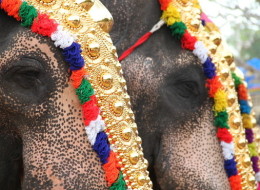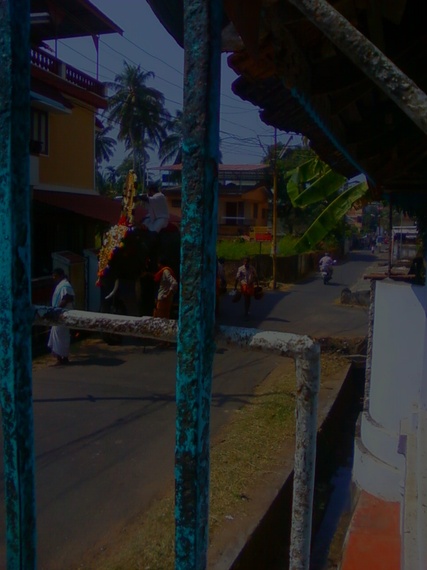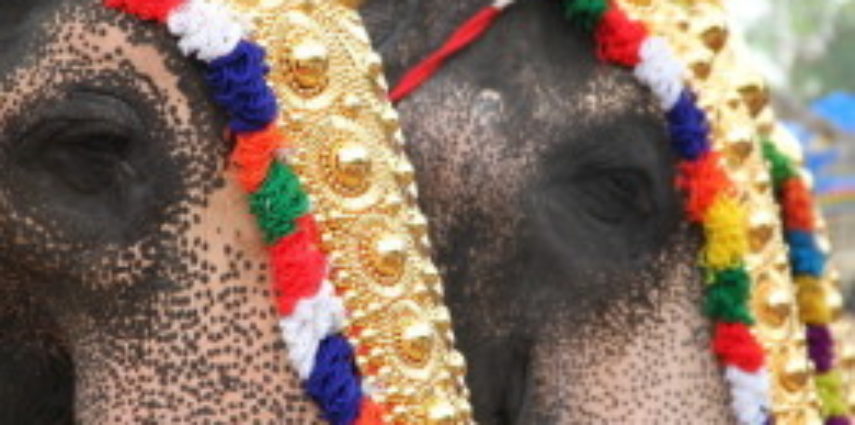
Something sinister is unfolding, as preparation for this year’s Trissur Pooram gets underway. The two main host temples –the Vedakkumnathan Devaswom and Thiruvambaadi Devaswom — will be parading a baby elephant each from April 24th through the 28th starting 8:00 a.m. to 9:00 p.m. During those four days the two babies will be paraded door-to-door to collect money. Essentially these elephants will be forced into child labour and beg for the temples’ coffers.

This exclusive image provided by Venkitachalam, HATF Secretary shows one of the elephants being paraded door-to-door
Then the world renowned Trissur Pooram kicks off on the 29th to the 30th of April where more than 100 male elephants will be trucked in and displayed on the famous Thekkingkaadu Maidaan, in the heart of Trissur city. They will be transported from all across Kerala to the state’s cultural hub, and paraded day and night, forced to stand for 36 straight hours, most of the time beneath the scorching sun.
This year’s Trissur Pooram is being closely scrutinized by the Animal Welfare Board of India (AWBI) after the central government agency investigated the living conditions of the temple and festival elephants. The Government of Kerala is required to obtain permission from the AWBI to parade 100 elephants, however the Forest Minister has rejected the AWBI directives, suggesting elephants used for culture and religion are exempt from such directives.
Tens of thousands of spectators from across India and around the world will take part in the spectacle, many of them unaware, and some turning a blind eye to the pain and suffering of the elephants. As the boisterous crowds dance away, the gentle giants will simply stand there and put up with the monotonous sounds of the drums and horns.
Then as night befalls the crude high decibel fireworks, and banned dynamites, will be used to amuse the masses, as the elephants will be tethered beneath a makeshift pavilion, just three hundred meters away from the earth shattering displays.
I can’t even begin to imagine what these elephants must go through. They can’t speak our language but they do express their distress by their stereotypic movements. These gentle giants have highly sensitive feet and trunk, and they can detect vibrations from the ground. According to Caitlin O’Connell,
“The tip of an elephant’s trunk has layers of cells called Pacinian corpuscles that are extremely sensitive to vibrations and is thought to be able to detect movement as subtle as Brownian motion. Pacinian corpuscles have also been found in the elephant foot – concentrated in the front and back (toes and heel area) dermal layer.”
The powerful fireworks are not only non-conducive for the elephants, but they also destroy properties in the vicinity. In fact every single year the roof tiles of the Vedakkumnathan temple, deemed to be a national monument, is blown off and then replaced. Apparently the renovations from last year’s damages were completed on April the 6th by the Archeological Survey of India (ASI). But the state authorities have allegedly allowed the festival organizers to use these fireworks without obtaining permission from the ASI.
Venkitachalam, the Secretary of the Heritage Animal Task Force (HATF), an outspoken critic of Trissur Pooram says,
“Every year this type of breakage of tiles happen causing high level damage to the property of the protected monument of Archaeological Survey of India. This type of misuse of power by officials to help Trissur Pooram organizers is to be dealt with stringent penal actions.”
Meanwhile, a writ appeal by a popular temple to transfer an elephant from another state to Kerala has been denied by the Kerala High Court. A judgement issued by the Kerala High Court suggests that an expat has made a significant financial donation to the renowned Vedakkumnathan Temple to purchase an elephant for rituals. The court document says,
“Mrs. Vinita Watson, native of Trissur and settled in USA, an ardent devotee of the Lord Bhagavathy of Paramekkavu wants to offer an elephant to the Devaswom, for which she deposited $90,000 USD in the account of the Devaswom.”
The temple authorities then submitted a formal application to procure a male elephant from outside Kerala state, which was rejected by the Principal Chief Conservator of the Forests (PCCF) and Chief Wildlife Warden (CWW). But the temple challenged that decision and took them to the High Court of Kerala in 2014.
The judge at that time overruled the forest department’s decision and approved the transfer of elephants to the temple stating that they were required to report only after transferring the elephant, and a prior permission from the CWW was not required.
The PCCF and CWW challenged that judge’s decision and finally justice prevailed for the elephants. The Honourable Chief Justice Mr. Ashok Bhushan upheld the forest department’s decision to reject the application for transfer of elephants arguing that,
“For transportation of an elephant from another state to Kerala or within the state of Kerala, prior permission is necessary under Section 40(2) of the Act, 1972, for which application in prescribed form has to be submitted by the applicant to the Chief Wildlife Warden, who has to consider the nature of transaction and after considering relevant facts and the schemes of the Act, take a decision on the application.”
I think people with disposable income like Mrs. Vinita Watson should seriously consider contributing their hard earned money towards elephant conservation, instead of their decimation. It may also be worth educating themselves about the pain and suffering that these elephants have to endure in order to perform temple rituals and parade in cultural festivals to entertain the masses.

